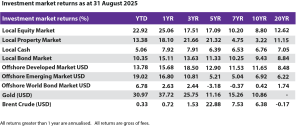Market Overview – August 2025
Market commentary
-
Local equities gained +22.9% year to date, supported by broad-based gains across all sectors. The Resources sector was the stand-out performer over the period, posting a +72.9% rally after a -7.2% fall in 2024. The Industrials sector added +18.0%, followed by Listed Property at +13.4% and Financials at +8.7%.
-
Local political developments shared some of the spotlight over the eight-month period. Despite earlier disagreements over the National Budget and VAT rate, the Government of National Unity (GNU) eventually managed to successfully negotiate and pass a revised fiscal framework during the quarter, offering investors some reassurance. Investor sentiment was further lifted following President Ramaphosa’s diplomatic visit to the United States, where he and opposition leader John Steenhuisen (DA) demonstrated a united front in discussions with U.S. President Trump.
-
South Africa’s economy stagnated in the first quarter of 2025, recording +0.1% GDP growth, as strong gains in agriculture were offset by contractions in mining, manufacturing, and utilities. The South African Reserve Bank (SARB) reduced its key interest rate from 0.75% to 7.0% in the first eight months of 2025. The SARB stated that the cuts aim to support a slowing economy amid an improving inflation outlook.
-
Local bonds posted a positive return of +10.4% for the quarter, ahead of local cash, which returned +5.1%.
-
The MSCI Emerging Markets Equity Index ended the eight-month period up +19.0% USD, outperforming its developed market counterpart. While global equity markets were initially shaken by President Trump’s sweeping ‘Liberation Day’ tariffs announced early in April, a subsequent 90-day reprieve bolstered market sentiment in the hope of fruitful negotiations to follow. Despite failed negotiations for many affected nations, positive equity price momentum was maintained through to August. The US secured trade deals with some major economies such as the UK and Japan, but failed to conclude deals with others such as India, Brazil, Switzerland, South Africa, and Canada, on which it has imposed tariffs of between 35% and 50%. China secured another 90-day reprieve, failing which both nations will impose tariffs of more than 100% on each other’s imports.
-
The People’s Bank of China (PBoC) kept its key lending rate unchanged at a record low of 3.0% in August, in line with market expectations. Taiwan, now the second-largest country allocation in the MSCI Emerging Markets Equity Index, also recorded strong gains as it continued to benefit from sustained investor optimism surrounding artificial intelligence. South Korea posted double-digit USD returns as political instability subsided following the election of a new president, Democratic Party candidate Lee Jae-myung.
-
The MSCI World Equity Market Index returned +13.8% USD over the eight months. The US equity market rebounded from April’s bear market drop. Gains were led by the information technology and communication services sectors, as investor appetite for the ‘Magnificent 7’ stocks reignited. Additionally, stocks with exposure to artificial intelligence rebounded following weakness earlier in the year.
-
The US Reconciliation Bill, referred to as the ‘Big Beautiful Bill’, was approved by the House of Representatives in June and by the Senate in July. The bill has raised concerns about US debt sustainability and its potential to significantly expand the US deficit.
-
The US Federal Reserve held its benchmark interest rate steady at 4.25% – 4.50% for a fifth straight meeting in July. The Bank of England (BoE) cut interest rates by 75 basis points to 4.0% over the year thus far, despite inflation remaining above target at 3.8%. Meanwhile, the European Central Bank (ECB) cut rates by 100 basis points in 2025.
Overall, global investor sentiment remained mixed in 2025. While the short-term outlook is still unclear, the longer-term picture remains positive. Patience, especially through periods of elevated volatility, affords markets the time needed to filter out what is relevant from the noise. This same patience allows market drivers and investment portfolios the required time to achieve a new state of normalcy and commensurate compound growth. GTC remains cautious in our portfolio positioning as we navigate through this market cycle.







